Getting a good night’s sleep is really important, especially for kids, as it plays a significant role in their growth & development. Nowadays, child sleep anxiety has become a worldwide concern. Where young ones often struggle to get sleep. If you want to learn more about the causes and symptoms of this condition, then keep reading this blog.
In this guide, we’ll discuss in detail the sleep anxiety problem, like how it affects the younger ones or even the entire family. And we’ll share practical tips to help your kids who are suffering from this condition, as it’s the main concern of your article.
What is child sleep anxiety?
Child sleep anxiety is a condition in which kids mostly have a phobia about falling asleep or staying asleep. They may think they have to stay alert or watchful all the time, or else something bad will happen.
It’s important to note that general sleep problems involve occasional nightmares, bedtime resistance, or irregular sleep. In contrast, if you talk about sleep anxiety, it is indeed totally different, as here you have to deal with a persistent emotional fear of sleep.
Similarly, if you notice, human habits or temporary disruptions actually cause general sleep problems, but they come and go. In comparison, sleep anxiety is driven by the brain’s fear system.
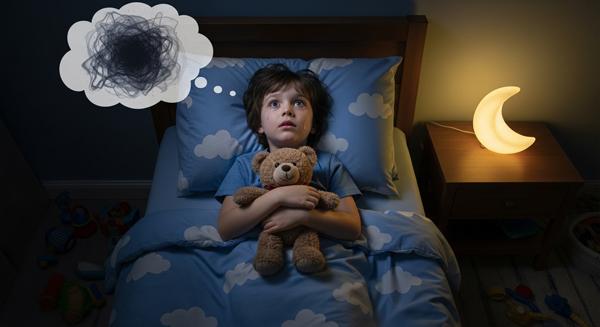


According to a research report, kids with anxiety disorders mostly experience sleep onset delay due to fear in their minds. However, the children without anxiety problems have sleep problems because of routine or lifestyle factors.
Long-term effects of untreated sleep anxiety
Honestly speaking! If you don’t pay attention to this sleep anxiety problem in your kids, it will affect their overall growth & development. This is because our brain, which controls our whole body from learning & memory to doing any physical activity, actually depends on adequate sleep. And when a child experiences sleep anxiety, then all the brain processes get disrupted. This negatively affects cognitive development, emotional regulation, behavior, and overall physical health over time.
| General sleep problems | Sleep anxiety | |
| Duration | Occasional | Persistent |
| Causes | Habits or temporary disruptions | Fear, worry, or anxiety |
| Bedtime experience | Mild resistance | Intense distress or panic |
| Daytime impact | Minimal | Affects mood, focus, and social life |
| Treatment | Routine adjustments | Coping strategies, routines, and sometimes professional help |
Common causes of sleep anxiety in children
Sleep anxiety isn’t a rare disorder; it’s fairly common among children. According to research conducted by PubMed, there is a high co-occurrence of sleep and anxiety problems in children. In this section, we are sharing with you the common factors that trigger sleep anxiety in kids.
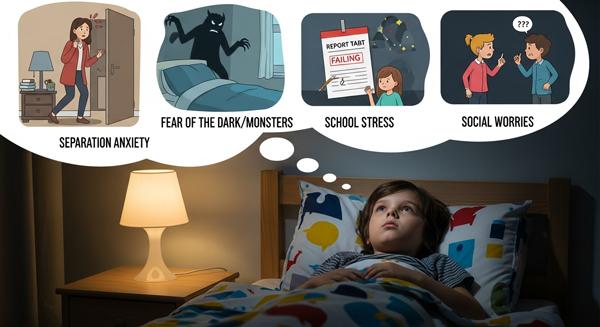


Fear of the dark, nightmares, or separation from parents
It’s a fact that most kids feel worried when they are alone at night. This is because if kids have any bad nightmares and wake up at night, their small worries can feel much bigger, making them feel scared. And kids who are sensitive to being away from their parents may develop persistent anxiety at bedtime.
Major life changes
Starting a new school, welcoming a sibling, or moving to a new home can also disrupt a child’s sense of security. And when kids go to bed, such worries surface, increasing sleep anxiety. This is because our imagination often turns harmless shadows into something frightening.
Stress and overstimulation before bedtime
Similarly, if your child engages in arguments or other stimulating activities close to bedtime, their mind, instead of relaxing, stays active and alert. As a result, it becomes harder for them to fall asleep, creating anxiety conditions.
Underlying conditions
The Brains of kids with ADHD or other mental health disorders remain more alert or easily worried. Consequently, their nervous system stays active at bedtime, making it harder for them to fall asleep peacefully.
Monitor your child’s online activity effortlessly with user-friendly tools.
Signs your child might be experiencing sleep anxiety
Here are some signs that help you identify sleep anxiety patterns in kids. Keep in mind that these are just clues; don’t rely on them completely.
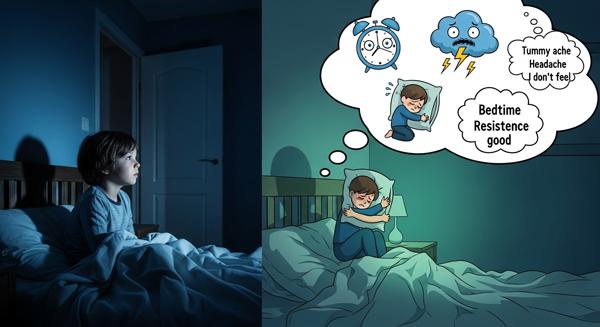


Physical signs
- Tense muscles or restlessness
- Sweaty or clammy hands
- Trouble staying still in bed
- Frequent night wakings
- Rapid heartbeat & breathing at bedtime
- Stomachaches, headaches, or other physical discomforts
Emotional & behavioral signs
- Doesn’t sleep alone and is calling for you (parent)
- Feeling worried at night
- Getting moody before bed
- Difficulty following bedtime routines
- Nightmares and crying
The impact of sleep anxiety on children and families
Effect of sleep anxiety on children
- Emotional health: Kids suffering from sleep anxiety mostly become irritable, moody, and remain mentally absent every time. This would affect their ability to handle daily tasks, rendering them withdrawn.
- Cognitive development: It can also impair your kids’ brain functioning, reducing attention, memory, and learning abilities. As a result, your kid would not get good grades in school.
- Physical health: In addition, this sleep disturbance not only affects the school performance but also your kids’ physical well-being. For instance, it may weaken immunity, reduce muscle strength, and make your kids more inactive than other kids.
- Social development: Do remember! Quality sleep helps to boost our minds and makes us feel fresh. Kids with sleep anxiety often feel tired and frustrated, which makes it harder for them to interact positively with others. As a result, forming friendships and even hanging out with peers becomes much harder.
Impact on parents and family dynamics
It’s important to note if any of your family members, like your kid, is suffering from sleep anxiety. Not only does he/she have to suffer, but it also leaves a lasting impact on the entire family, disrupting family routines and creating a tense atmosphere among family members. Also, seeing such a condition, the parents themselves remain stressed. Over time, this ongoing stress can affect household harmony and emotional well-being.
How to help a child with anxiety sleep: Practical strategies
You can definitely help your child reduce anxiety and improve their sleep quality by incorporating a few habits before bed. However, it may take some time to take effect. Trust me, with patience and understanding, you can help your child achieve restful, peaceful sleep.
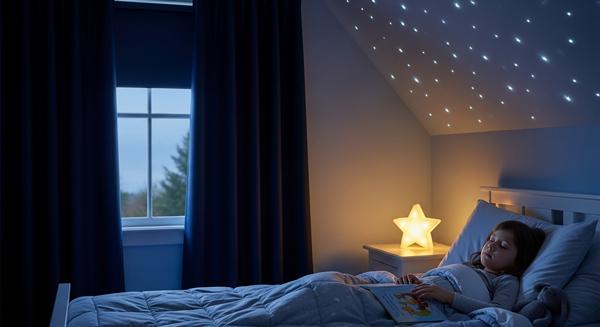


Establishing a consistent and calming bedtime routine
You should start with a calming pre-sleep routine that signals your brain it’s time to sleep. For instance,
You should encourage your kids to follow a consistent bedtime or wake-up schedule.
Plus, try adding some brain-calming activities like reading a book, listening to soft music, or taking a warm bath before bed.
You shouldn’t allow your kids to use screen media (mobiles, laptops, tablets, etc.) for 1 hour before bedtime. You know, research shows that at night, screens emit blue light, which disrupts melatonin production and affects the sleep-wake cycle.
Creating a sleep-friendly environment
Furthermore, for better sleep, it’s important that the room’s surroundings are somewhat relaxing. Don’t worry! You can do the following to make your kids ‘ bedroom sleep-friendly!
- If you think your kid has a fear of darkness, you can make use of blackout curtains or soft nightlights in their bedrooms.
- Additionally, you should try to limit exposure to noisy devices, clutter, and bright lights at night.
Teaching coping mechanisms and relaxation techniques
You can also make your kids learn different techniques to cope with anxiety and fall asleep, like;
- Deep breathing: Guide your child to take slow breaths in and out to relax tense muscles.
- Mindfulness or kid-friendly meditation: Teaching kids to just focus on their present moments, like their breathing, sounds in the room, despite their worries.
- Visualization: Tell your kids that whenever they feel insecure or experience fear, they should imagine a safe, happy place, like a beach, a garden, or a cozy fort.
Addressing specific fears and worries
On top of that, you should spend quality time with your kids and ask them politely what scares them at bedtime. If your tone is supportive, your child will be more likely to express their fears. This way, you would better understand the causes and take appropriate action.
Nutritional and lifestyle considerations
It’s crucial to understand that sleep anxiety not only comes with daily life worries, but your diet also plays a role. You know that too much sugar or caffeine can hamper your child’s ability to fall asleep.
That’s why you should reduce or eliminate their intake throughout the day, especially before bed. Although promoting hydration is good, limit liquids close to bedtime to prevent nighttime urination.
When to seek professional help?
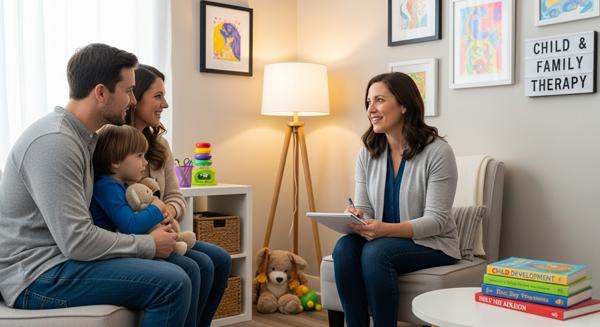


If you notice any of the following signs, stay alert as the situation worsens and seek professional help.
If the sleep problems (Insomnia) last for almost 4 weeks despite consistent reassurance.
Anxiety is spilling over into daytime activities, affecting school, play, and others.
Loud snoring, waking up during the night, and gasping for breath.
If your kids are regularly receiving physical complaints like stomachaches, headaches, or fatigue at bedtime.
Your child begins to avoid school, friends, or other social activities because of anxiety.
Parents feel overwhelmed or unable to manage bedtime struggles effectively.
Tips for building long-term healthy sleep habits
From the above discussion, it’s now clear how important it is to get quality sleep. That’s being your well-wisher. Here are some strategies you must follow to help kids develop healthy, long-term sleeping habits.
Encourage independence and positive associations with bedtime
You should help your kid feel confident about going to bed. For instance, let them choose their pajamas, pick a bedtime story, or decide the order of their routine. These small things would build a sense of independence in kids, making bedtime a pleasant, reassuring part of their day instead of a challenge or struggle.
Model calm nighttime behavior as parents do
Kids are basically copycats of their older siblings. That’s why you should be a role model. First, you should follow healthy sleep habits, such as maintaining a consistent routine, a dark, quiet environment, and no screen use before bed. It is more likely that, by seeing you, your kids would automatically adopt such habits.
Use positive reinforcement rather than punishment
It’s best to celebrate small wins, such as when kids follow their bedtime routines. Then you should praise by saying I’m proud of you. Trust me! Your words are just enough to motivate your kids far more effectively, despite punishment.
Track sleep progress with a bedtime journal or app



In addition to the above, you can use technology, such as a bedtime journal or app, to track your kids’ sleep. Such apps help parents stay 24/7 updated on kids’ sleep patterns, including when they fall asleep, how often they wake up, and how they feel in the morning.
Final thoughts
In short, child sleep anxiety is really an important issue to address; if left untreated, it would leave long-lasting impacts on your kids’ overall development. That’s why you should first check whether your kids are suffering from this condition by following the clues mentioned in the article.
To help kids enjoy better sleep at night, you should encourage a consistent sleep routine, create a sleep-friendly environment, and ensure their diet is sleep-friendly before bedtime. However, if the sleep anxiety problems persist, then you must seek professional help to ensure your child receives the right guidance.

